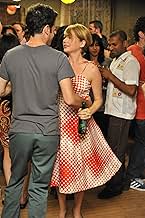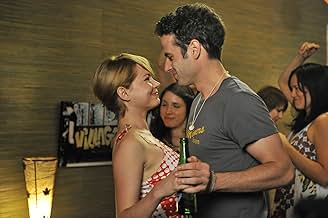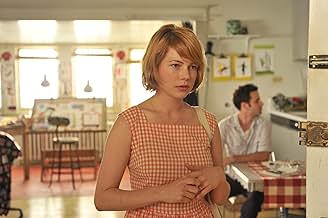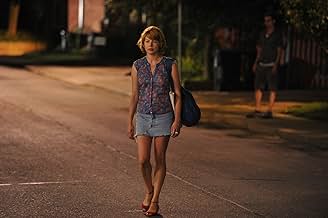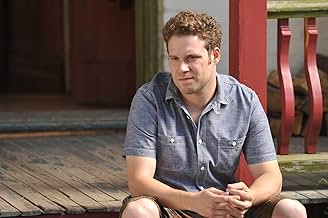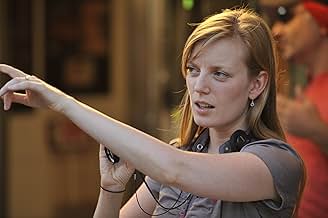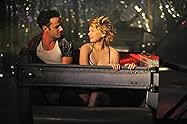A happily married woman falls for the artist who lives across the street.A happily married woman falls for the artist who lives across the street.A happily married woman falls for the artist who lives across the street.
- Awards
- 3 wins & 19 nominations total
Vanessa Carter
- Tony
- (as Vanessa Coelho)
Ciarán MacGillivray
- Soldier
- (as Ciaran MacGillivray)
- Director
- Writer
- All cast & crew
- Production, box office & more at IMDbPro
Featured reviews
On my first viewing of Take This Waltz, after the film was over, I said in confidence and self assuredness to the people I went to see the film with, that I did not like it. However a strange thing happened. I saw the film and was unable to write my review of it until now and in that delay of time I started thinking of the film more and more and it seemed to resonate and stay with me and there were certain scenes and just whole issues, or ideals that were brought up during the film that I gave second thought to and reconsidered. Having written my review of Take This Waltz, immediately after watching it, I would have probably have given it a rating of 6 out of 10, but as I have thought and pondered over the characters and meaning of the film and just how it makes more sense to me now and in a sense has also grown on me, I now give the film my definitive rating of 8 out of 10. On first viewing there were some things I really liked about the film such as the interesting yet hauntingly beautiful colour contrast to the homes, interiors of the homes and even what the characters wore. It gave the film a distinct look and I admired it for that. I also appreciated that we could have a serious film about people in their 20's with no use whatsoever of cell phones, the internet, or any type of social media devices. It just felt more real having not used those things and avoided being too commercial as well. The one thing that I think really got me about the first viewing of the film was how I really did not like the main character Margot, played by Michelle Williams. I found it very irritating and awkward to the point of being irritating. She didn't seem to know how to act, or behave in certain situations and when she did speak, or try to live her dreams of fantasies it all just felt and looked terribly awkward and clumsy. Take for example her baby talk with her husband, Lou. It seemed so childish and really grated on my nerves. Also the fact that she was so indecisive about everything as well. Also on first viewing I felt that perhaps not all of the characters were as developed as they could have been and overall at the end of the film I think I got what director/writer Sarah Polley was trying to say, but at that point I was not interested anymore and I did not care either. Having thought about the film for a few days I came to realize that Michelle Williams' character Margot, is not as annoying, or irritating as she once seemed and even if she is a little bit, I could now understand why. I think the point was to show a character such as Margot, who is really indecisive about life and the choices that she makes and also shows how insecure and unhappy she is. I think Margot, was really stuck in a situation that became routine and comfortable for her, but she is a restless character always wondering if there is something new and better for her elsewhere. I think Margot's awkwardness as well as nervousness shows because of how insecure and uncomfortable with life and making decisions is hard for her. She wants to do what is right, but not destroy everything she has at the same time. It also lead me to think that I have known women like Margot, and they behaved in a similar such manner as she does in the film and for the exact same reasons that I mentioned above. It is not necessarily a character flaw, but perhaps just a weakness and a stumbling block that one needs to work on. The other characters later on seemed more well developed than on first glance and the film certainly does give a lot of food for thought. I literally spent days afterwards thinking about this film and some of the powerful and heartbreaking images in it. The film is a fairly depressing watch in a lot of ways, but I could respect that about the film because any film dealing with such subject matter, should be serious and take their character's feelings and emotions to heart and all that is here. The film does still have some flaws with it's pacing and there are times where it gets swept up in it's melancholy and it can tend to drag a little bit, but there is still enough rewarding things on display here to be worth a watch, even if you have to think about the film a couple days after you watch it, or even have repeat viewings. Brave viewers should give the film a chance and think about what it says about loneliness, relationships and the myths we sometimes promise ourselves, but ultimately lie to each other and ourselves about. An intelligent and deeply thought out film worthy of an 8 out of 10 rating and not just a 6.
OK it's not as bad as all that -- it is sort-of OK -- but I had to say it. I'm probably not the first.
This is basically a short film on infidelity, dragged out to a couple of hours. It's not terrible, but it's also not good.
The film has its good points, of course. I found the cinematography to be great, for example. Particularly the shots in and around water were very effective, and showcase the use of film to communicate without words. But the fact that I'm noticing the cinematography first tells you that the story isn't really there.
I thought the acting was believable. Everyone performed well in their roles, as far as I can tell. Seth, Luke, and Michelle were good choices for the triangle. That said, I am confused about casting not just one but two popular comedians against type. It made me question what I was supposed to be seeing. I'm not sure I figured it out.
For me I attribute the problems to editing and writing.
The story didn't provide anyone for me to root for, identify with, or even hate. I didn't really care for any of the characters. I like these actors, but I found these characters annoying to varying degrees, but not so annoying as to be detestable. I just didn't wish to spend any more time with any of them than I had to. Perhaps if I could recognize in them any motivation for their actions (or lack thereof) it might be different. I compare this with The Postman Always Rings Twice, where understandable things happen, and lead to a more satisfying (but too preachy-perfect) ending.
The long silences here are not deep and meaningful. They're just long. I figure the film could be cut by half an hour, and not lose much beyond silence or small talk. In fact, even the end could be lopped off. There were several points where I thought it was over, but it kept going. What's odd is that there are some scenes where random half-second cuts are made, music-video-style, but real cuts to speed it along aren't made. I'm certain you could cut another hour or so and turn it into a really great short. There's nothing wrong with that, if telling the story with emotion is the goal.
The tie-in to Leonard Cohen's song seemed forced. I cringed. When I think about that scene, it feels to me like someone decided we needed a cryptic song by a Canadian poet to name the film after. I don't feel that any of the characters in the film are devoted Leonard Cohen fans.
Overall, I wouldn't recommend this film, but neither would I say to avoid it. It will surely be on the The Movie Network (among others) in Canada, since they apparently helped pay for it. The best place to see it is therefore probably cable or satellite.
This is basically a short film on infidelity, dragged out to a couple of hours. It's not terrible, but it's also not good.
The film has its good points, of course. I found the cinematography to be great, for example. Particularly the shots in and around water were very effective, and showcase the use of film to communicate without words. But the fact that I'm noticing the cinematography first tells you that the story isn't really there.
I thought the acting was believable. Everyone performed well in their roles, as far as I can tell. Seth, Luke, and Michelle were good choices for the triangle. That said, I am confused about casting not just one but two popular comedians against type. It made me question what I was supposed to be seeing. I'm not sure I figured it out.
For me I attribute the problems to editing and writing.
The story didn't provide anyone for me to root for, identify with, or even hate. I didn't really care for any of the characters. I like these actors, but I found these characters annoying to varying degrees, but not so annoying as to be detestable. I just didn't wish to spend any more time with any of them than I had to. Perhaps if I could recognize in them any motivation for their actions (or lack thereof) it might be different. I compare this with The Postman Always Rings Twice, where understandable things happen, and lead to a more satisfying (but too preachy-perfect) ending.
The long silences here are not deep and meaningful. They're just long. I figure the film could be cut by half an hour, and not lose much beyond silence or small talk. In fact, even the end could be lopped off. There were several points where I thought it was over, but it kept going. What's odd is that there are some scenes where random half-second cuts are made, music-video-style, but real cuts to speed it along aren't made. I'm certain you could cut another hour or so and turn it into a really great short. There's nothing wrong with that, if telling the story with emotion is the goal.
The tie-in to Leonard Cohen's song seemed forced. I cringed. When I think about that scene, it feels to me like someone decided we needed a cryptic song by a Canadian poet to name the film after. I don't feel that any of the characters in the film are devoted Leonard Cohen fans.
Overall, I wouldn't recommend this film, but neither would I say to avoid it. It will surely be on the The Movie Network (among others) in Canada, since they apparently helped pay for it. The best place to see it is therefore probably cable or satellite.
Common terms associated with movies about infidelity would be "lust," "passion" and "betrayal," yet all those things are suspiciously absent from Sarah Polley's infidelity drama, "Take This Waltz." Her film is about as anti-soap opera as you can get — careful to avoid melodrama and dedicated to sidestepping any and all conventional depictions of adult relationships in film.
It seems odd to call Polley bold for showing it like it is, the way that she drags us through the head of her main character, Margot (Michelle Williams), who so undeniably loves her husband, Lou (Seth Rogen), yet cannot deny her feelings for Daniel (Luke Kirby), a man she meets while away for work who turns out to be her neighbor. However, when it comes to filmmaking, anything that deviates from Hollywood reality can make an audience uncomfortable, so it takes some guts to ignore that filmmaking impulse.
Consequently, a good chunk of viewers will be turned off or frustrated by "Take This Waltz," losing patience with the inaction of its characters and pulling their hair out over the tension oozing out of the most casual character interactions. Yes, "Take This Waltz" can be so uneventful that it verges on pointless, but in time Polley's intentions become very clear.
As Margot and Daniel get closer, they don't really get closer, and as Margot and Lou drift apart, they actually come off as in love as they've ever been. For much of the film, it's in Margot's head that the cheating is actually happening. Her thoughts and actions are not in sync and it becomes extremely difficult for us to find empathy for her because we feel as though she needs to act on her feelings, to either voice her displeasure to Lou or throw herself at Daniel. That's the Hollywood impulse calling.
Polley continues to resist, and as challenging as it becomes to watch at times, her film comes out better for sticking to its convictions. As she clearly intended, a switch flips in a scene in which Margot and Daniel ride an indoor Scrambler as "Video Killed the Radio Star" plays, an in the loopy chaos of the scene, we (and Margot) find a certain clarity in understanding what's going on between the main characters.
There's a definite phantasmagoria to Polley's style as well that while visually engaging contrasts a bit with what's otherwise such a nuanced, completely believable film. Several scenes play out like dream sequences, but we later can confirm they actually happened. She seems quite content to toy with our expectations and challenge what we think we know to be true about how love works.
You couldn't cast a better actress than Williams with a performance that's so hard to pull off. We only identify with Margot because we see her humanity, but it's tough to understand her and in some cases even like as a third-party observer of her story. Williams should be lauded for volunteering for this experiment and selling it as well as she does, especially when you consider that Kirby is a total unknown and Rogen is a poster child for modern comedy, for formulaic comedies that are such a far cry from "Take This Waltz."
The end of the movie is bound to bother a lot of people, while others will be intrigued at the choice and make peace with what Polley has to say because she frankly makes a good argument. Fidelity gets such a black-and-white portrayal in film and television, though maybe that's a societal thing because of its prominence in religious code. Nevertheless, she utilizes every tool at her disposal to present the gray area that we so quickly jump to deny and shudder to embrace.
It's tough to really enjoy a film that doesn't emotionally click, in which we don't feel with our hearts that things should've turned out how they did, but Polley has such a beautiful directorial style and conveys her intentions so clearly that "Take This Waltz" warrants a certain degree of respect for its bold yet so honest and impressively perceptive take on love.
~Steven C
Thanks for reading! Visit moviemusereviews.com for more!
It seems odd to call Polley bold for showing it like it is, the way that she drags us through the head of her main character, Margot (Michelle Williams), who so undeniably loves her husband, Lou (Seth Rogen), yet cannot deny her feelings for Daniel (Luke Kirby), a man she meets while away for work who turns out to be her neighbor. However, when it comes to filmmaking, anything that deviates from Hollywood reality can make an audience uncomfortable, so it takes some guts to ignore that filmmaking impulse.
Consequently, a good chunk of viewers will be turned off or frustrated by "Take This Waltz," losing patience with the inaction of its characters and pulling their hair out over the tension oozing out of the most casual character interactions. Yes, "Take This Waltz" can be so uneventful that it verges on pointless, but in time Polley's intentions become very clear.
As Margot and Daniel get closer, they don't really get closer, and as Margot and Lou drift apart, they actually come off as in love as they've ever been. For much of the film, it's in Margot's head that the cheating is actually happening. Her thoughts and actions are not in sync and it becomes extremely difficult for us to find empathy for her because we feel as though she needs to act on her feelings, to either voice her displeasure to Lou or throw herself at Daniel. That's the Hollywood impulse calling.
Polley continues to resist, and as challenging as it becomes to watch at times, her film comes out better for sticking to its convictions. As she clearly intended, a switch flips in a scene in which Margot and Daniel ride an indoor Scrambler as "Video Killed the Radio Star" plays, an in the loopy chaos of the scene, we (and Margot) find a certain clarity in understanding what's going on between the main characters.
There's a definite phantasmagoria to Polley's style as well that while visually engaging contrasts a bit with what's otherwise such a nuanced, completely believable film. Several scenes play out like dream sequences, but we later can confirm they actually happened. She seems quite content to toy with our expectations and challenge what we think we know to be true about how love works.
You couldn't cast a better actress than Williams with a performance that's so hard to pull off. We only identify with Margot because we see her humanity, but it's tough to understand her and in some cases even like as a third-party observer of her story. Williams should be lauded for volunteering for this experiment and selling it as well as she does, especially when you consider that Kirby is a total unknown and Rogen is a poster child for modern comedy, for formulaic comedies that are such a far cry from "Take This Waltz."
The end of the movie is bound to bother a lot of people, while others will be intrigued at the choice and make peace with what Polley has to say because she frankly makes a good argument. Fidelity gets such a black-and-white portrayal in film and television, though maybe that's a societal thing because of its prominence in religious code. Nevertheless, she utilizes every tool at her disposal to present the gray area that we so quickly jump to deny and shudder to embrace.
It's tough to really enjoy a film that doesn't emotionally click, in which we don't feel with our hearts that things should've turned out how they did, but Polley has such a beautiful directorial style and conveys her intentions so clearly that "Take This Waltz" warrants a certain degree of respect for its bold yet so honest and impressively perceptive take on love.
~Steven C
Thanks for reading! Visit moviemusereviews.com for more!
This movie was hauntingly real--subtle in its slow approach to the climax and it stays with you long after you have left the theater. All of the actors are wonderful and capturing the nuances of their characters. Sarah Polley does it again. The story, set in Toronto, captures the everyday life of Margot and Lou--and depicts their special relationship through the details of their special ways of communicating. It is not until the complexities of Margot's struggle between her love for Lou and her unyielding attraction to her neighbour, that you start to feel her personal struggle. The inevitable ending does not disappoint. Highly recommended.
This film shouldn't work nearly as well as it does. Take This Waltz centres around a two-suitors plot that was tired a century ago, takes place in a hipster-utopia version of Toronto, has multiple comedic actors who've worn out their welcome doing Serious Roles, and its characters are either selfish or dull. But Take This Waltz also has a kind of magic that can wash over the most jaded cinema viewer and make you forget that you've seen it all before.
Maybe it's Sarah Polley's direction, or maybe it's the brilliant performance of Michelle Williams that makes her character likable against all odds. Maybe the thematic statement about the perils of looking for adventure and the need for constant romance is something that we need affirmed more often against the tide of romcoms and gooey melodramas. Maybe it's just that I really want to live in hipster- utopia-Toronto. But this film stuck with me for days afterwards, its scenes playing over and over in my mind, blotting out all the rest of the disposable entertainment. There are so many indelible images here: a public shower scene which plays pranks on the male gaze, that goofy but somehow powerful 360-degree-rotation montage, and of course the final scene, a coda that grants its central character and us along with her a moment of unmediated joy. And it's that joy that the film understands as being something we maybe have to pursue no matter what its cost. Michelle Williams' abashed smile gives us a taste of that adventure, and like the rest of the movie, it's damn hard to resist.
Maybe it's Sarah Polley's direction, or maybe it's the brilliant performance of Michelle Williams that makes her character likable against all odds. Maybe the thematic statement about the perils of looking for adventure and the need for constant romance is something that we need affirmed more often against the tide of romcoms and gooey melodramas. Maybe it's just that I really want to live in hipster- utopia-Toronto. But this film stuck with me for days afterwards, its scenes playing over and over in my mind, blotting out all the rest of the disposable entertainment. There are so many indelible images here: a public shower scene which plays pranks on the male gaze, that goofy but somehow powerful 360-degree-rotation montage, and of course the final scene, a coda that grants its central character and us along with her a moment of unmediated joy. And it's that joy that the film understands as being something we maybe have to pursue no matter what its cost. Michelle Williams' abashed smile gives us a taste of that adventure, and like the rest of the movie, it's damn hard to resist.
Did you know
- TriviaMichelle Williams said in an interview that she, Sarah Silverman, and Jennifer Podemski didn't want to film the full nude shower scene. But they agreed to because it fit the story. She said it, like other nude scenes she's filmed, is like sky diving. The first few moments are terrifying when you strip off your robe in front of the crew, and then you get used to it and it may even be fun. But she said it was much easier doing that shower scene than the nude scenes she did in previous films with men. She said it's much easier to be naked with other girls than boys.
- GoofsIn the beginning of the film a day passes by showing the relative movement of the sun - the light moving on the walls. The sun moves from west to east.
- ConnectionsFeatured in Great MoVie Mistakes (2013)
- SoundtracksGreen Mountain State
Written & Performed by Corinna Rose & The Rusty Horse Band
Used by permission of Corinna Rose & The Rusty Horse Band (SOCAN)
Details
- Release date
- Countries of origin
- Official sites
- Language
- Also known as
- Triste canción de amor
- Filming locations
- Louisbourg, Nova Scotia, Canada(lighthouse)
- Production companies
- See more company credits at IMDbPro
Box office
- Gross US & Canada
- $1,239,692
- Opening weekend US & Canada
- $137,019
- Jul 1, 2012
- Gross worldwide
- $4,965,950
- Runtime
- 1h 56m(116 min)
- Color
- Sound mix
- Aspect ratio
- 1.85 : 1
Contribute to this page
Suggest an edit or add missing content







